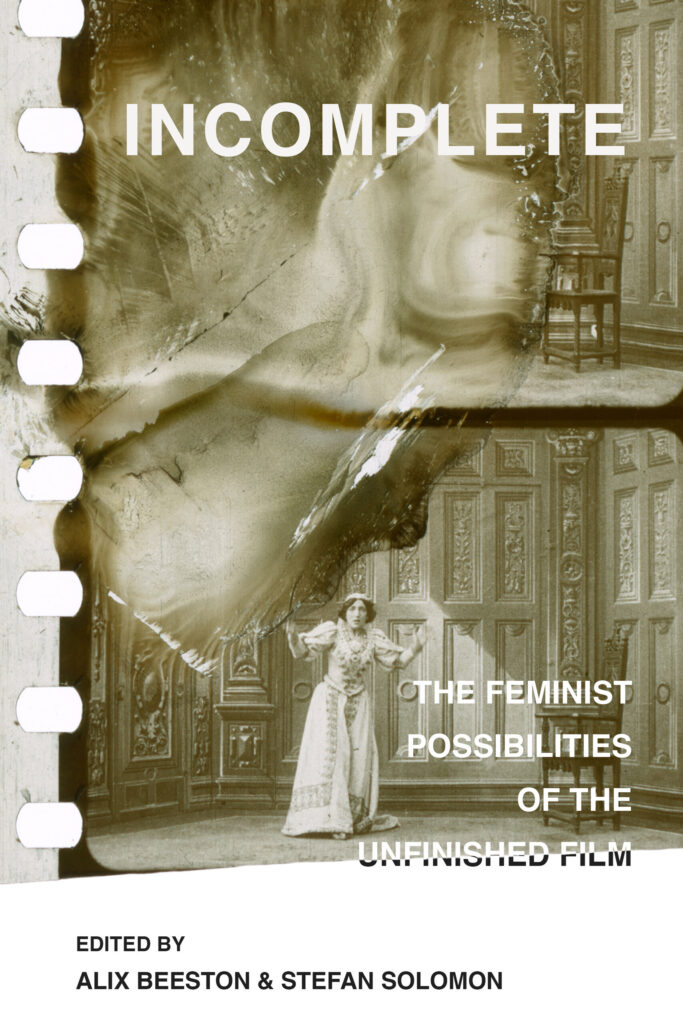Incomplete
Award-winning volume now out with the University of California Press

Coedited by Alix Beeston and Stefan Solomon, Incomplete: The Feminist Possibilities of the Unfinished Film is a field-defining volume of essays that establishes unfinished film projects—abandoned, interrupted, lost, or open-ended—as rich and underappreciated resources for feminist film and media studies. In a series of deeply researched and creatively conceived chapters, scholars join with film practitioners in approaching the unfinished film as an ideal site for revealing the lived experiences, practical conditions, and institutional realities of women’s film production across historical periods and national borders. Incomplete recovers projects and practices marginalized in film industries and scholarship alike, while also showing how feminist filmmakers have cultivated incompletion as an aesthetic strategy. Objects of loss and of possibility, incomplete films raise profound historiographical and ethical questions about the always-unfinished project of film history, film spectatorship, and film studies.
You can view the recording of the online launch of Incomplete here. Alix has also shared about Incomplete on the New Books Podcast, the Unfinishing Podcast, BBC Radio 3, BBC Radio Wales Arts Show, Finnish Radio, and at an online discussion hosted by the Center for Media and Celebrity Studies. She has also presented work from this project at events at Berlin’s Silent Green/Kino Arsenal and Swansea’s Volcano Theatre. Alongside this book, Alix and Stefan cocurated the film festival and workshop series Unfinished: Women Filmmakers in Process at Chapter Arts Centre, Cardiff, in November 2022. The program with essays is available to download here and festival reviews appeared at Wales Arts Review and in the Feminist Studies Association newsletter.
Incomplete was awarded Best Edited Collection 2023 by the British Association of Film, Television, and Screen Studies and received Honourable Mention for the Susan Koppelman Award for the Best Anthology, Multi-Authored, or Edited Book in Feminist Studies in Popular and American Culture. It was also shortlisted for the Media, Communication, and Cultural Studies Association Edited Collection of the Year and longlisted for the Kraszna-Krausz Moving Image Book Award.
“A groundbreaking volume, Incomplete establishes the feminist possibilities of the unfinished film, a capacious category encompassing works that are lost or fragmentary; projects that were unrealized, aborted, or thwarted; and films that are deliberately open-ended or ongoing. Surprisingly generative rather than a mark of failure, incompletion is a powerful site of possibility for feminist film scholarship and filmmaking. By creatively expanding the methodologies and theoretical frameworks of feminist attention to filmic incompletion, this volume expertly demonstrates the rich and varied potentialities of incompletion.” Allyson Nadia Field, author of Uplift Cinema: The Emergence of African American Film and the Possibility of Black Modernity
“Alix Beeston and Stefan Solomon’s Incomplete exquisitely resists film studies scholarship’s impulse to exalt ‘whole’ or ‘complete’ films. Instead, this impressive collection counsels us to recalibrate our understanding of incompleteness and fragmentation, attuning ourselves and the field of cinema and media studies to the radical possibilities of unfinished film projects. A model of feminist film scholarship, Incomplete‘s ingenious essays offer compelling accounts, deft theoretical pivots, and innovative approaches to women’s film production, consumption, circulation, and authorship. An outstanding work, this collection is required reading for scholars of film history.” Samantha N. Sheppard, author of Sporting Blackness: Race, Embodiment, and Critical Muscle Memory on Screen
“This fascinating book demonstrates the connection between feminism and film history as necessarily incomplete projects. The editors’ brilliant concept is beautifully brought to fruition, if not completion, by the book’s contributors, whose insights will set up sparks of continuing inquiry in its readers—which deserve to be many.” Patricia White, author of Women’s Cinema, World Cinema: Projecting Contemporary Feminisms